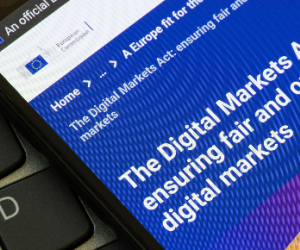The key EU Digital Markets Act (DMA) changes set to impact the payments industry. An SPA Insight - March 2024

The Digital Markets Act (DMA) places new obligations on ‘gatekeepers’ that offer core platform services to businesses and end users located in the EU.
Under the DMA, gatekeepers must actively adopt behaviors that promote competition. In relation to payment services, this includes providing third-party access to specific technical functions like NFC that will open the door to new innovations and extend consumer choice.
1. Introducing the DMA
The Digital Markets Act (DMA) came into force in November 2022, setting out new obligations for large online platforms and search engines.
Nine months later, in September 2023, the European Commission named the first six Big Tech companies (1) designated as ‘gatekeepers’ of the digital economy. These gatekeepers, whose dominant presence makes them difficult for consumers and business users to avoid, now have until April 2024 to bring their core platform services into compliance with a number of obligations imposed on them under the DMA.
Created to ensure a fair and level playing field for all digital companies, regardless of size, and to increase consumer choice, the DMA legislation imposes a number of measures on gatekeepers that are designed to:
- Eliminate practices that could prevent other firms from entering or expanding across digital markets.
- Facilitate switching and multi-homing between services for users (for example, through data portability and interface interoperability).
- Control how user data is processed, and when such data must be made available to users and third-party competitors.
From a payments industry perspective, the DMA regulation sets out some other key requirements for gatekeepers. For example, they must:
- Allow users to install and use third party payment apps for in-app purchases made on their mobile devices.
- No longer restrict app developers to solely using their services (such as built-in payment systems or other technical services).
2. How do these new rules impact the payments industry?
Article 5 of the DMA sets out a series of obligations and restrictions for companies designated as gatekeepers. Most pertinently, it includes a key paragraph that relates to the unbundling of payment services from a gatekeepers’ core platform services.
In relation to third party digital services, Article 5 states that gatekeepers cannot:
- Combine data generated by access to a gatekeeper’s services with data generated when users access third party services without the explicit and informed consent of the user.
- Impose pricing conditions on services offered by third party providers that directly compete with services offered by the gatekeeper.
- Restrict advertising by third party service providers.
- Impose the use of the gatekeeper’s identification system.
- Impose interoperability requirements for payment applications in relation to the hardware and software functionalities of a mobile device.
In essence, Article 5 of the DMA empowers app developers and businesses selling through a gatekeeper’s platform to choose their own payments service provider, rather than being confined to only using a gatekeeper’s payment services.
In relation to mobile payment services, it also means that end users are no longer obliged to use the de-facto payment wallet that is pre-installed on their device. Instead, users are free to replace this with another payment wallet or can opt to install a third-party payment wallet that will co-exist alongside their device’s pre-installed wallet.
Critically for the payments industry, by requiring gatekeepers to provide open access to their operating system, hardware, and software features – including NFC for mobile payments - Article 5 of the DMA facilitates the wider deployment of third-party payment mobile payment wallets that utilize NFC technology. In other words, in the EU, mobile wallets will no longer be limited to only using QR code-initiated payments.
3. Exploring the potential: future implications for the consumer payment experience
With mobile payments playing a growing role in today’s digital economy, the mandate on gatekeepers to provide third party access to technical functions like NFC on devices has significant implications for the rapidly evolving consumer payments industry.
Removing restrictions on accessing NFC capabilities means that banks and other providers will be able to offer apps that also rely on mobile NFC technology to facilitate convenient and secure ‘tap and go’ POS payments. A move that is set to streamline and elevate the POS payment experience for European consumers and extend payment choice.
Historically, access restrictions to NFC functionality on mobile devices have forced independent payment service providers to offering proximity payment instruments that require consumers to scan and/or generate a QR code.
However, these payment solutions typically utilize proprietary and non-interoperable QR codes. As a consequence, the market for QR code payments in Europe and other regions around the world remains highly fragmented, with a lack of common technical standards that are needed to drive global adoption at the POS. By contrast, the mobile device NFC interface offers both global interoperability and reach in a highly secure way.
In Europe, the new open access conditions to the NFC controller imposed by the DMA presents an opportunity for Instant Payment service providers to leverage the NFC interface in addition to QR codes. Offering contactless NFC transactions gives consumers greater convenience and an optimized and secure user experience.
It is a move that could power up consumer adoption of new open banking payment innovations – including emerging services that allow people to make POS transactions directly using their bank accounts.
4. In conclusion
By ensuring equal access and interoperability to NFC on mobile devices, Article 5 of the DMA opens the door to the introduction of new innovations by participants in the European payments industry.
Looking ahead, this could help facilitating the use of alternative devices to the smartphone as well as facilitating the future introduction of the European Central Bank’s proposed digital Euro.
In conclusion, the DMA lays the foundation for enabling the essential universal acceptance and mass consumer take up that European payment providers need when implementing new mobile payment schemes.
(1) Alphabet, Amazon, Apple, ByteDance, Meta, Microsoft (https://ec.europa.eu/commission/presscorner/detail/en/ip_23_4328)


